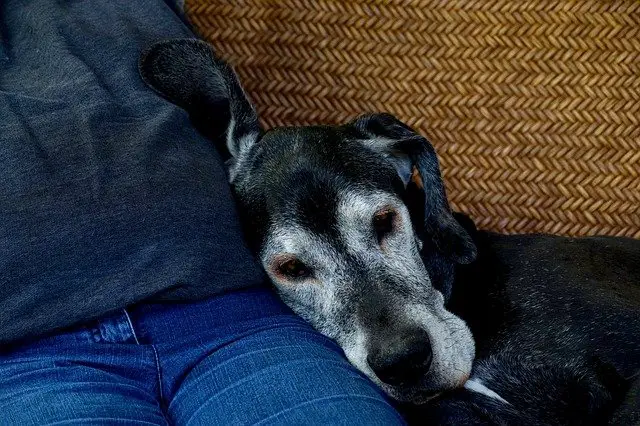Our pets are part of the family, and for most of us, checking up on where they are and what they’re doing has become a part of our daily routine. Most pets remain close to their dog parents, considering them as members of their very own pack, but as a dog reaches later years of life, you may observe them seeking more autonomy. Sometimes, dogs would go on their own when they feel like they’re nearing death and the possible explanation for doing it goes all the way back to their early dog ancestors.
Why Do Dogs Seek Solitude When They’re Dying?
Knowing that a dog is trying to hide because it is near death is catastrophic and nobody likes to think about any of it. However, dogs are instinctual animals, and there are unexplainable things that they do.
So, do dogs run away to die? The most common theory is that dogs instinctively try hiding to defend themselves. The other hypothesis is that dogs are not really trying to hide, rather they ran away but are too sick to come back.
Although dogs are bred in captivity, they have animal inclinations to survive in the wild. Wild dogs did whatever it took to preserve themselves, and throughout their lifetimes, they hunted, prowled, stayed packs, and protected themselves against predatory animals. A dog whose body fails and has no means to fight back often hides. Their reflex is to detach themselves for the sake of protection.
Dogs listen to their bodies, which is one of the reasons why they hide when they sense that they’re going to die. He understands that he’s weaker and therefore unable to defend himself, which also tends to make him extremely vulnerable to attack by predators. By attempting to hide, he’s just doing the best thing he can to preserve and keep him safe.
This gut reaction can surpass the years of love, security, and comfort you’ve provided to your best friend. It’s hard for people to accept that their dog is hiding in distress when you sit by his side, but it’s not your fault; it’s his inclination.
If you do have an elderly dog with deteriorating health and issues like blindness, hearing loss, reduced mobility, or neurological disabilities such as stroke, your dog may be wandering away.
If, in addition to these problems, he’s easily tired, it could be too difficult for him to work his way back home. He would have found a place in close proximity to stay hidden and safeguard himself as best he could. However, although your pet knows it’s dying, leaving it alone to isolate itself outside is dangerous, especially with how the streets make it vulnerable to vehicles, predators, and severe weather.
Try Encouraging the Behavior

Relationships with dogs can be complicated, and who can precisely tell what the dog wants and doesn’t want at the point of death? Dogs do not give living wills or even have the necessary but distressing discussions you might have had with an elderly member of the family. Whenever anyone ends up going to the hospital, they get a call from their emergency contact. Your pet might have just been trying to walk away to hide, so there’s no phone call in any way. Nevertheless, you know your dog the best and are aware of what’s best for it. Only a dog can make the decision to choose whether or not to hide before the end, but then you can keep a close eye out for any warning signs and look for a chance to provide some comfort.
Dogs Do Not Walk Away to Avoid Hurting Their Owner’s Feelings
To put it clearly and simply: animals that are aged, ill, and weakened are already struggling and are in need of care to relieve their pain in whichever form. Although the idea that they are veering away to die in a peaceful manner is rather poetic, studies contend that they drift away and are unable to return.
They may have stumbled along a small hill or into a creek and are physically incapable to get out of there. Perhaps, they became disoriented like elderly humans do and cannot make their way back home, or they traveled aimlessly in search of a safe place. Possibly, God forbid, they have been attacked by some other animal and that they were too slow to run away and then either killed or too gravely wounded to come back.
Older pets may suffer from hearing loss, vision impairment, cognitive impairment (an animal variant of Alzheimer’s), debilitating arthritis and muscle weakness, or a multitude of severe, medical conditions which may make it difficult for them to come home after they have gone very far. Even dogs who are not irreversibly impaired cannot flee attack, speeding cars, or spatial disorientation. If the weather gets bad, they’re much more likely to have difficulties. Imagine yourself if you were lost, cold, wet, and scared.
Old pets may require as much monitoring as kittens and puppies to stay out of trouble. Keep them inside a fence, leash, or just allow them outside under constant monitoring. If you ever see an unidentified dog walking around your area, kindly stop to help! It may be an old friend of somebody who “ended up going away to die” and needs you to notice and take care of.
Pet Hospitals suggest that general changes to a pet’s routine are great things to watch out for, such as lack of appetite, loss of enthusiasm in the activities that your dog once loved, changes in sleep patterns and moodiness, or unease in handling.
Of course, observing some or all of these indications is no assurance that your dog will end up dying. The best way to approach your dog’s vital processes is to keep in touch with your vet, who might have been able to detect symptoms of dying and can help you evaluate the life quality of your dog.
If the health of a dog is deteriorating, it is better to make a hard choice to euthanize instead of waiting for nature to run its course, which really is rarely pleasant and soothing; quite often, it is violent and tends to cause immense suffering.
Dogs very seldom die in peace and do not wander in order to relieve our feelings. This is a fictional story devised to make people feel better. They’re suffering at times, and they need help in dying, and you’re the one who needs to know when this is the case. They don’t deserve to approach death frightened, bewildered, lost, and all alone.
What Are Signs of a Dying Dog?

If you personally believe that your dog might be responding to her urge to die on its own, there are indications to look out for. Certainly, age also is a factor, and so is the presence of ailment, whether chronic or recent. A few of the indications that a pet is starting to reach demise usually involve lack of coordination, chronic tiredness, loss of enthusiasm with its surrounding environment, decreased appetite, quivering of muscles, or deterioration of intestinal control.
If your dog is already old, be vigilant about his health and well‐being. If they show symptoms of a decline in health, contact your vet. Your vet can discuss to you about their health if they are suffering, and their professional opinion about how to deal with the situation.
If your dog is blind, deaf, and has a stroke-like neurological trauma, discuss with the vet how to keep your dog in a secure environment so it is less prone to stray aimlessly. Ensure you get a secure yard with a fence and hold the doors shut.
Other Solutions to Consider
It’s their suffering to take into account if you have a sick or an elderly dog. If he ends up trying to hide, this could take much more time for him to die. It may even be natural and a survival tactic, but there is still a huge potential for pain. If you start noticing the indications that your dog is nearing an end, cooperate with your vet. If you’d like to provide your pet with solace and a safe, warm room, your vet can help you with how to do it.
You understand your dog better, and like most pet parents, you want to give him all that you can to make him feel better.
Caring For Your Dying Dog
As your dog approaches the end of life, there are many things that merely cannot be helped, no matter how we hoped we could. Even so, you can make small changes that would make your dog more comfortable over the last days, weeks, or months.
Giving a hygienic, warm, convenient environment for your dog to relax is a good way to improve its life quality, as it ensures it can easily access food, water, and designated toilet breaks. Hospice is an alternative for anybody with a dog diagnosed with terminal sickness, and therefore should be addressed with your veterinarian if you’d like to walk this path.

